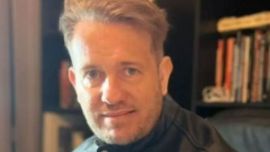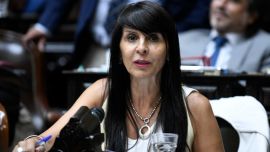From the moment we sit down in the aptly chosen London City Café in downtown Buenos Aires, the conversation flows with ease.
Charlie Taylor, a series producer at the BBC, is a curious soul, one who’s eager to learn more about the country he’s visiting as he prepares to record another edition of the World Questions show that has taken him across the globe.
This weekend, Taylor will broadcast the views of porteños on BBC World Service radio station to tens of millions of listeners across the world.
It’s the second time that the British Broadcasting Corporation has returned to Argentina’s capital to record a show. The last occasion was in March 2020, when its carefully organised plan to host an audience-led debate in a downtown Buenos Aires theatre was curtailed by the arrival of Covid-19 in Argentina.
The show went ahead, without an audience. And that's far from ideal, Taylor explains in an interview with the Times, as the punters are really the stars of the show.
As we talk, the veteran producer explains to the Times that this visit is a chance for the BBC to deliver on its original promise. He’s excited to be in Argentina at a time when there’s plenty to talk about: a recent assassination attempt on the vice-president, an economic crisis with runaway inflation and deepening poverty, corruption cases and school seizures run across the headlines.
Taylor, 56, has been with the British broadcaster for 27 years and has a wealth of experience to match. He has helmed a host of award-winning quality radio programmes, but today the questions are focused firmly on the show he’s here to record.
How long have you been with the World Service now?
So I work for the BBC, for factual radio. And I've been making programmes for the World Service for 12 or 15 years now, something like that. I’ve been working for the BBC in total for 27 years, so I’m relatively new! [Laughs]
You make World Questions for BBC but you have been at the helm for a host of other shows too – World of Wisdom, The Engineers, a recent series on white-collar crime… Tell me a little about your role at the BBC.
So what I do is I create events and run partnerships for the BBC World Service. World Questions is staged in partnership with the British Council, which has a worldwide network of deep contacts in a lot of countries and they help us. We’re editorially independent, so all the choices about who goes on the panel and the subjects, that's all done by us, but in terms of finding places and spaces to stage it – for example, the Teatro Picadero – that’s found and suggested by the British Council and they support us in doing that.
How many World Questions shows do you do a year?
We do 12 a year, so one a month.
And how many editions have you done personally?
So I've done probably 30 to 40 of these. Probably – I haven't counted to be honest!
I've done other events too and we found during the pandemic that doing [World Questions] on Zoom with a panel and an audience is actually really effective in a different way. It creates a different type of commonality that allows us to go across borders, and also we can go to places where it wouldn't be possible for security reasons to put on a debate. So we've done virtual ones in Afghanistan…
What’s on the wish list? North Korea? China?
We've got some impossible ones, some countries where I feel that we should bring some light to bear. I’d really be interested in doing one in Iraq, it might be possible in some form.
I wanted to ask your opinion about podcasts and how that’s affected broadcasting. To me, they seem to have opened up this kind of different space, of people talking in a different manner, people being much more personal, much more open.
Well, I can’t speak for the whole of the BBC and BBC Sounds, but what I can say is what I realise as a journalist is that you've got to know when to get out of the way.
Although it seems very different from doing a political debate in Argentina, there are great similarities, people talking directly to each other. What we will have at the Teatro Picadero is people in the audience asking their question to the panel and they have to answer that question to those people – there's a real power in that.
It’s the audience first, and I think that's what's happened with podcasts too, people want direct access, and they don't want it mediated.
How has broadcasting changed over your career? Is the ‘on-demand’ aspect the main change?
It’s a really big question! [Laughs]
I think that [people talking directly] the biggest change, the one that I've been most interested in. Lectures and presenters telling people how to think about things… that seems to me to not be the way things are going.
Throughout my career, what I've always been really interested in championing is hearing the experts, being a facilitator. Don’t mediate all the time, facilitate.
Do you think people in journalism are more hostile today when they’re interviewing? I feel like there’s more willingness to have different types of tones.
I can only speak for myself, not all of journalism. What we do [with World Questions] is we take people who are often in power and give an audience the opportunity to speak directly to them – and sometimes that audience might be hostile! Sometimes that audience might feel threatened by some decisions that have been made and want to show their anger. That can be justified. But we also have to protect discourse – we don’t bring our politicians onto a panel to throw brickbats at them.
A good example would be when we were in Jamaica. Somebody asked a question and said ‘I come from the part of town you're scared to walk in, a poor part of town, and you see us as a dangerous place yet I see it as a place that needs love and that’s needed because of the terrible harm of slavery felt by different generations – what are you going to do about this?’ And she asked that to the foreign minister of Jamaica, ‘What are you going to do to get reparations for slavery?’
It was a proud, strong, direct question, the whole audience was right behind her. And the foreign secretary made a really good attempt to answer – she couldn't say yes or no because these are very deep negotiations, if she makes a claim, it’s going to be reported around the world with diplomatic repercussions. Then, if you hear the clip, you will hear the polite but firm and direct way that the presenter [of the show] keeps her to the question. She [the foreign secretary] says she can’t give a yes or no answer, that she can see her team in the audience who have trained her not to answer it, and she explained the diplomatic aspect to the audience.
She was put on display but she was treated with respect, she was given a chance to answer, but when she tried to get away from it, the presenter brought her back to it. He didn’t go hostile on her, he treated her with respect and there was more understanding from the audience as a result. It’s a democratic experience.
That brings me to the panel. How do you choose your members? Do you get local people to help you choose? What about balance?
First of all, there’s no such thing as perfect balance. You can't balance every opinion in the country and we do a series of questions to try and balance. And we don't know what the questions will be! You get questions on the economy and we try to balance that with social issues, like abortion, etc. But you might find that you prepare for that, arrive and no-one asks that question! We don’t know, we have to guess!
Also, you’re not just looking for political balance, you might be looking for gender balance, you might look for ethnic balance, or religious balance, socio-economic balance… all these other things.
What you want to do is get a variety of voices because on the big issues you want to have differences of opinions and you want people to, in the audience, to come in and sit down with you and look at that panel and think they are some different and interesting voices.
We try to represent the major opposition party, usually the main, sometimes the second-largest, depending on the country. We have somebody to represent the government or the government point of view.
Also, you’ve got to think that people have got to be able to speak well in English and if you have somebody who's representing their party that doesn't speak English fluently, then you've unbalanced it.
Why Argentina? Why come back?
We like to deliver on our promises! We came here in March 2020… people might remember! [Laughs]
Covid was developing and the atmosphere was changing very quickly. Although it hadn’t been banned, we took the decision for the safety of the audience not to go ahead with an audience.
We promised we would be back when we were able and we’re back because we’re able!
What commonalities are there among audiences at these shows?
They always have opinions and people are always excited at speaking truth to power. They always love submitting questions and there are always surprises – and we look for those!
Argentina is not the only country in the world that sees itself as having a division running through society and what we do is – and what we aim to do – is bring those societies together to talk to each other, debate each other, so you actually hear the other side give their opinion.
We use the English language and I’ve seen an audience do a debate in their own language and then do it again in English and sometimes, in English, it’s a little bit like coming to someone else’s house and you might bring slightly better manners.
Obviously your reach is gigantic. What’s so important about the BBC World Service and its work?
What we bring is news that you can trust, in a time when there’s so many competing sources of news and you have the authority of the BBC and its journalists who are committed to bringing you the truth, bringing you a multitude of voices.
It’s an organisation that supports freedom of speech and the ability to speak truth to power. This is what World Questions and other questions does. Some places in the world want to see their culture reflected to them honestly and they come to the BBC for that and we do our best to provide it.
To listen to the show, visit https://www.bbc.co.uk/programmes/w3ct3hnt.






















Comments